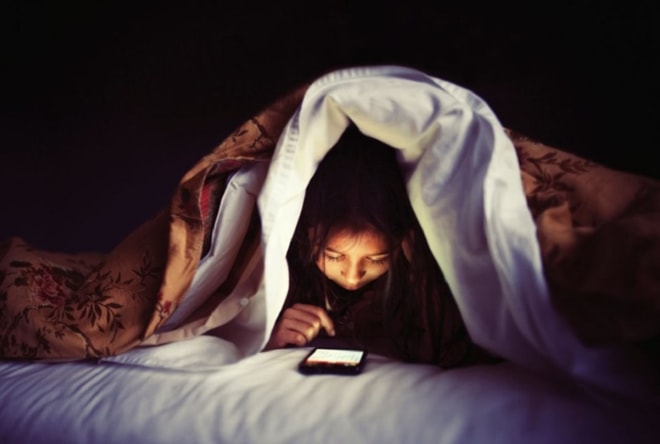How to prevent the harmful effects of blue light when using the phone at night
Using artificial light and electronic devices at night leads to insomnia, fatigue, obesity or depression.
Good sleep is key to good health. However, we are sleeping less and the quality of our sleep is also decreasing compared to the past. Sleep deprivation can lead to heart disease, type 2 diabetes, depression and obesity. The use of artificial light and electronic devices at night can be the cause of sleep problems, according toHealth line.
These devices emit blue wavelengths of light, which tricks our brains into thinking it’s daytime. Blue light in the evening disrupts the brain’s natural sleep-wake cycle. It’s emitted from smartphones, computers, and bright lights that can inhibit or disrupt sleep if you’re exposed to it at night.
|
Photo: Healthline |
Your body has an internal brain clock that regulates your circadian rhythm according to a 24-hour biological cycle. However, the circadian rhythm needs signals from the external environment, especially daylight and darkness, to regulate itself.
Sunlight is white light that contains a mixture of different wavelengths. All of them contain a significant amount of blue light. Getting blue light from the sun during the day helps you stay alert, improves your performance and mood. Blue light therapy devices can help treat depression. Blue light bulbs have been shown to reduce fatigue and improve mood and sleep performance in office workers.
However, modern light bulbs and electronic devices such as computer screens produce large amounts of blue light, which can disrupt your body clock if you are exposed to it in the evening. When it gets dark, your body releases the hormone melatonin, which makes you tired and want to go to sleep.
Studies show that evening melatonin suppression is linked to health problems like obesity, cancer, and depression. Exposure to blue light in the evening tricks your brain into thinking it’s daytime, which suppresses melatonin production and reduces the amount and quality of sleep you get.
Measure
Studies show that when people use tinted glasses to block blue light, even in bright rooms or while using electronic devices, the glasses largely eliminate the melatonin-suppressing effects of light.
In a two-week study, 20 people were divided into two groups. One group wore glasses that blocked blue light for three hours before bed. The other group did not wear glasses that blocked blue light. The first group experienced significant improvements in both sleep quality and mood.
In another study in older adults with cataracts, blue light blocking lenses were also shown to improve sleep and significantly reduce daytime dysfunction.
One popular way is to install a program that automatically adjusts the color and brightness of your screen based on your time zone. When it's dark outside, it blocks all blue light and turns the screen a pale orange. You can also install similar apps on your phone.
Additionally, you can turn off all the lights in the house 1-2 hours before going to bed; read books with red or orange light or you can use candles. Keep your bedroom completely dark or use a sleep mask.
If you have a history of difficulty sleeping, try reducing your exposure to blue light in the evening by wearing amber-tinted glasses or trying some other remedies.

